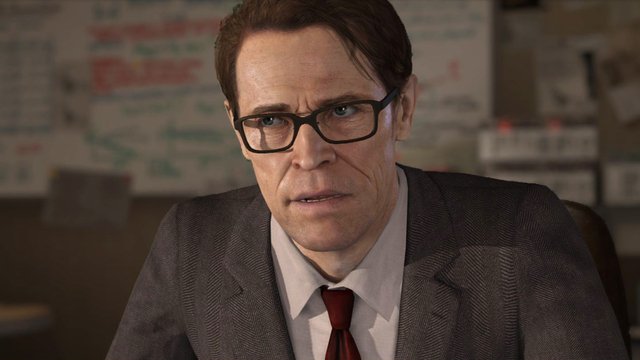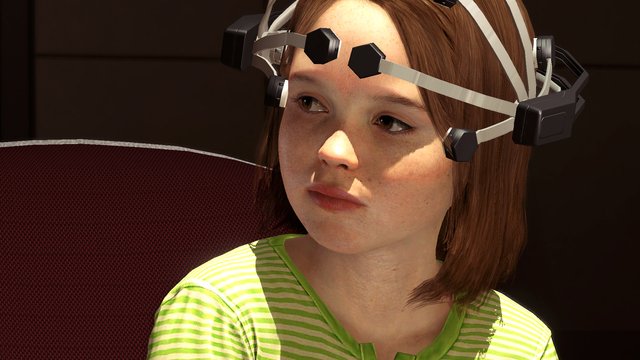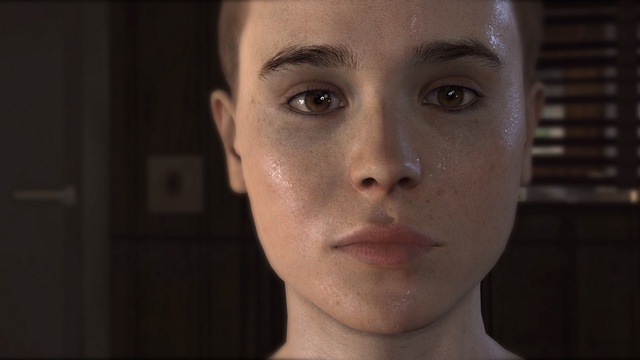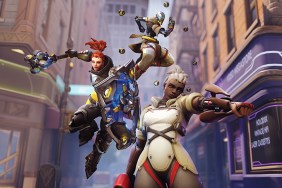As the spirit moves you.
Beyond: Two Souls, as Heavy Rain and Indigo Prophecy before it, challenges the common preconceptions of successful video game design. There is no life gauge, no loot drops, no experience points, no open world, no competitive multiplayer, no overly violent power fantasy. Developer Quantic Dream imagines games that marry the acting talent and high production values of film with the choice-driven narrative of games; in this case, the motion-captured performances of Ellen Page and Willem Dafoe with a supernatural story with twists, turns, and multiple endings. It's this special brand of cinematic gameplay that, despite its concessions for the sake of the story, is the lure and ultimately the saving grace of Beyond: Two Souls.
At its crux, the plot of Beyond: Two Souls revolves around the loss of family, a theme that steadily makes itself more apparent as you progress through the journey of Jodie Holmes, a woman who has always had an otherworldly connection to an entity named Aiden. While Jodie (Ellen Page) can commune with her ghostly companion and compel him to scout an area and protect her from harm, he's not always an angel. Of his own free will, he can knock over furniture and aggressively intimidate people. He can even be controlled by a second local co-op player, if you so choose. Either way, Jodie's witch-like ability pins her as an outcast, despite her desire to live like a normal teenage girl, and as a subject for protective study by the Central Intelligence Agency by way of head researcher Nathan Dawkins (Willem Dafoe).
Unlike the four interwoven character arcs in Heavy Rain, Jodie Holmes remains the central focus of the narrative, though as indicated by her introduction in the prologue, she can't quite place the events of her past in a chronological line. Similar to the original televised airing of The Melancholy of Haruhi Suzumiya, the plot is told nonlinearly with each gameplay section typically taking place at a starkly different time in Jodie's life than the one before it. This leaves room for you to envision the missing links, while the timeline on the loading screen fills gradually throughout the game, and speculate how each piece connects to each other. It may seem disorienting at first, but the effect is purposefully luring and the story isn't difficult to follow so long as you remain attentive.
That said, the underlying reason for this plot manipulation, revealed in the epilogue, is rather arbitrary and more interesting than it is meaningful. Though time-jumping from one segment to the next encourages you to remain alert and engaged, it sacrifices and disrupts the potential empathy you might have with the side characters Jodie meets along the way. It also cuts away some of the tension between each scene that might have been maintained better if Beyond: Two Souls was constructed in chronological order, perhaps with occasional flashbacks and without so many breaks. After the credits roll, you can begin a new game at any chapter in the now fully reconstructed timeline, which may have been done to encourage you to replay the entire game chronologically anyway.
Thankfully, no matter which gameplay segment you play, Beyond: Two Souls is uncannily gorgeous. Say what you will about David Cage's borderline-obsession with aesthetics, but the motion-captured expressiveness of every character, Jodie Holmes especially, is mesmerizing. Everything from facial movements and walking animations, to the voice-acting and soundtrack, push the PlayStation 3 to its limit and show the importance of presentation in portraying a believable story. The attention to detail, with environments filled with an incredible amount of objects, isn't merely a graphical exercise in realism but reveal a part of each character's personality, particularly Jodie's room which changes dramatically as she matures.

With the welcome exception of not having to hold down a button to walk anymore, getting through Beyond: Two Souls will be familiar to anyone who has played Heavy Rain. Jodie can roam around each environment casually during exploration sequences and can interact with any significant objects with button prompts. Dialogue with any NPCs sometimes allows Jodie to ask a set of questions or react differently to a situation. Action sequences have been altered slightly, with cut-scenes going into slow-motion every time Jodie needs to attack and dodge. A simple nudge in the same direction that Jodie is moving, though it's randomly dependent on however the designers decided to move the camera around, will allow her to survive intact.
While this rudimentary control scheme works well enough without any considerable trouble, it's sometimes cumbersome, especially during sequences where Jodie must move from cover to cover. Luckily, in these combat-oriented scenarios Aiden can usually be summoned to eliminate more than several enemies with possession or spectral chokes. The more pressing issue is that Jodie sometimes walks when she should be running, particularly if there's a passive time limit. For some dialogue options that give you the option to reject an action, she'll accept anyway, which defeats the whole purpose for having a choice.
On that note, Beyond: Two Souls isn't as daring and experimental as Heavy Rain, which would completely eliminate characters from the story if they died. Here, the chance at failure isn't as prevalent, and the ending is marginally affected by your choices throughout the game and more by the final decision, the same issue that plagued Deus Ex: Human Revolution. You'll need to accept several concessions to believe the story, since Aiden should be able to shield Jodie from anything, or choke out and possess anyone, but whose power is limited for the sake of the narrative.

But that doesn't mean Beyond: Two Souls lacks poignancy. Jodie's growth from a child into a formidable woman is pivotally influenced by two moments in her life that, to keep this as spoiler-free as possible, are set in two extremely different climates. I wish both of these sections were extended into multiple parts so that they weren't immediately put off to the side until the ending. The ultimate reveal as to why Jodie and Aiden is connected, despite its suddenness, makes perfect sense and sentimentally accentuates the theme.
Beyond: Two Souls, despite its flaws with the mechanics and the story, is a special game that needs to be played, if just to behold the new level in video game presentation. Though it's not as well-crafted in design as Telltale's The Walking Dead, Beyond: Two Souls is not that far off, cementing Quantic Dream as a cutting-edge developer in the cinematic, story-driven genre.
-
Gorgeous motion-captured animations
-
Strong soundtrack and voice-acting
-
Great acting performances from Ellen Page and Willem Dafoe
-
Nonlinear storytelling more interesting than meaningful
-
Playing as Aiden is wickedly fun
-
Jodie's journey has poignant moments
-
Having "refuse" turn into "accept"
-
Press-a-button endings
-
Lumbering cover-based sequence







